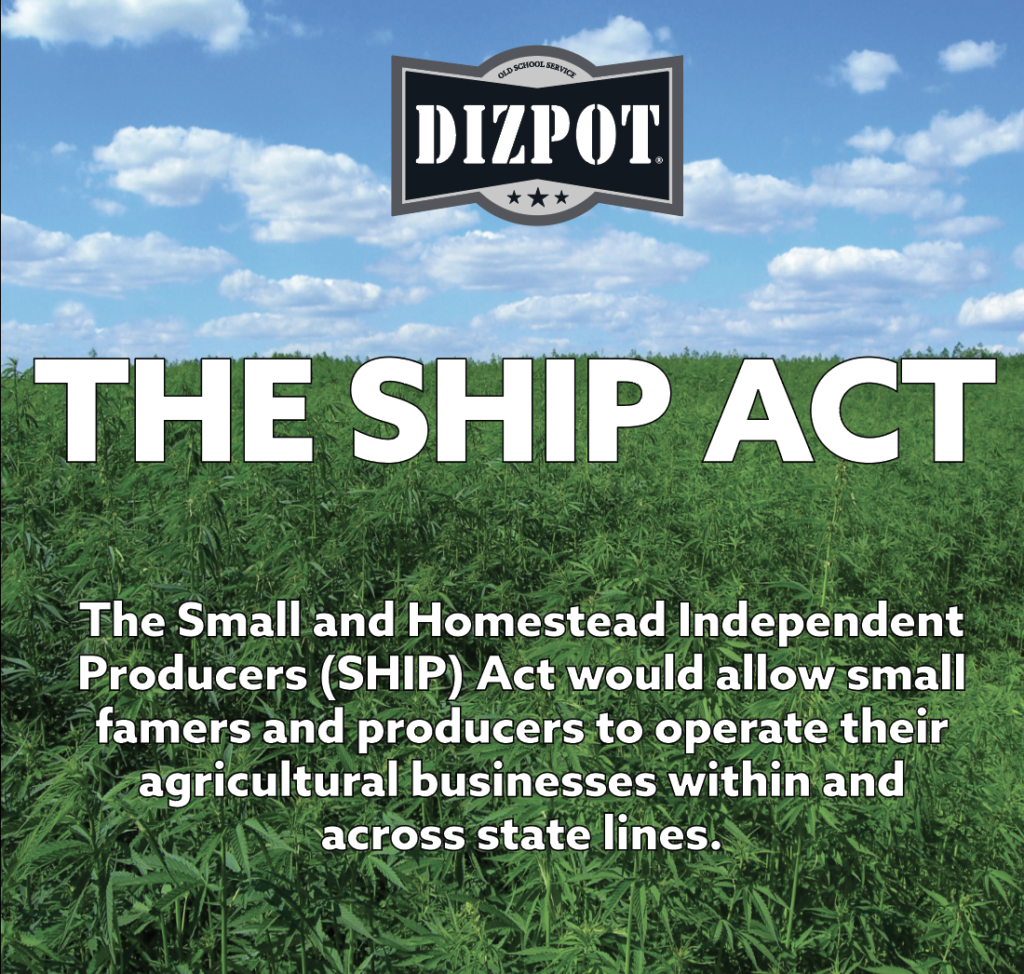Author: Nathalie Porter, DIZPOT Marketing Director
Recently introduced by two pro-canna congressmen—Rep. Jared Huffman (D-CA) and Rep. Earl Blumenauer (D-OR)— the SHIP Act would allow small-scale producers to ship and sell products directly to consumers within and across state lines once marijuana is federally descheduled.
Leafly points out that this legislation would give smaller cannabis players a needed tool to compete. “Customers anywhere in the country could access sought-after products, and producers themselves would save big on third-party distribution fees. Barring future legislation, only these small businesses could take advantage of the shipping policy.”
“At DIZPOT, while we now are known globally for our cannabis packaging, branding and distribution expertise, we started out small,” says DIZPOT Co-Founder and CEO John Hartsell. “We serve cannabis companies of all sizes—from small operations to global brands—and support the idea of the SHIP Act evening out the playing field once marijuana is legalized on a federal level.”
The SHIP Act is tailored to smaller operations to give them a leg up in a sure-to-be flooded and even more competitive marketplace. Only smaller operations would be able to take advantage of the direct-to-consumer policy. This includes cultivators who grow up to 5,000 square feet in indoor cultivation, up to 22,000 square feet in greenhouses, and/or one acre of mature canopy outside. On the manufacturer front, it would apply to those who have less than $5 million in gross annual income.
“In traditional agriculture markets, direct-to-consumer models such as The SHIP Act have traditionally been a valuable marketing tool for small farmers,” John Hartsell says. “This is because it allows them to have their products reach consumers and go to market without having to invest in third-party retailers or distributors. The SHIP Act will help smaller operations compete against multi-state operators, making the industry more accessible and equitable once cannabis is descheduled.”
“Too often, the federal government falls behind, and the gears of Congress work too slowly to keep up with the pace of a changing economy,” Representative Huffman, one of the congressmen who introduced the bill, says in a recent statement. “Under my bill, folks in my state [and others] will be able to ship their products straight to consumers when the antiquated federal prohibition on cannabis is finally repealed. As large, commercial cannabis operations squeeze out local producers from the market, this legislation is critical for farmers to survive and expand their small businesses. We cannot leave our smallest family-farmers behind under full legalization.”
Industry Support and Other Legislation
With support for “the little guy,” many organizations in the cannabis sector—including DIZPOT—are in support of this bill, which is cosponsored by Earl Blumenauer, Co-Chair and Founder of the Congressional Cannabis Caucus. It is endorsed by the Origins Council, Humboldt Country Growers Alliance, F.A.R.M.S. Inc, Washington Sun & Craft Growers Association, Vermont Growers Association, Maine Craft Cannabis Association, Farm Bug Co-Op, Big Sur Farmers Association, Nevada County Cannabis Alliance, Mendocino Cannabis Alliance, Trinity County Agricultural Alliance, and the Sonoma County Growers Alliance, among others.
This bill is just one of many pieces of federal legislation currently being considered on a federal level and across multiple states that are preparing for the eventuality of cannabis being federally legalized.
“It’s important to get behind and learn about the SHIP Act and other pro-canna pieces of legislation while they’re being discussed,” says Jeff Scrabeck, Co-Founder and COO at DIZPOT. “The SHIP Act would only go into effect after cannabis is federally descheduled, but multiple cannabis organizations of all shapes and sizes are in support of the bill. There’s room for everybody as companies like DIZPOT and others work on making the industry more accessible and equitable for current and future cannabis operations—especially those growing and manufacturing on a smaller scale.”
